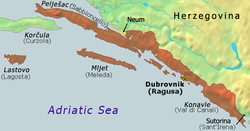
Back Republica de Ragusa AN جمهورية راغوزا Arabic República de Ragusa AST Dubrovnik Respublikası AZ راقوسا جومهوریتی AZB Дуброўніцкая рэспубліка BE Дуброўніцкая рэспубліка BE-X-OLD Дубровнишка република Bulgarian Republik Ragusa BR Dubrovačka Republika BS
Republic of Ragusa | |||||||||||||
|---|---|---|---|---|---|---|---|---|---|---|---|---|---|
| 1358–1808 | |||||||||||||
| Motto: Latin: Non bene pro toto libertas venditur auro Croatian: Sloboda se ne prodaje za svo zlato svijeta Italian: La libertà non si vende nemmeno per tutto l'oro del mondo "Liberty is not well sold for all the gold" | |||||||||||||
 Borders of the Republic of Ragusa, from 1426 (encompassing also the area labelled "Neum" until 1718) | |||||||||||||
| Status | Sovereign state which was a Tributary state of:[citation needed]
| ||||||||||||
| Capital | Ragusa 42°39′N 18°04′E / 42.650°N 18.067°E | ||||||||||||
| Common languages | |||||||||||||
| Religion | Catholicism | ||||||||||||
| Government | Aristocratic merchant republic (city-state) | ||||||||||||
| Rector as Head of state | |||||||||||||
• 1358 | Nikša Sorgo | ||||||||||||
• 1807-1808 | Sabo Giorgi | ||||||||||||
| Historical era | Middle Ages, Renaissance, Early modern period | ||||||||||||
• City established | c. 614 | ||||||||||||
• Established | 1358 | ||||||||||||
| 1205 | |||||||||||||
| 27 May 1358 | |||||||||||||
• Ottoman tributary | from 1458 | ||||||||||||
| from 1684 | |||||||||||||
| 26 May 1806 | |||||||||||||
| 9 July 1807 | |||||||||||||
| 31 January 1808 | |||||||||||||
| Population | |||||||||||||
• Estimate | 90 000 in the XVI Century | ||||||||||||
| Currency | Ragusa perpera and others | ||||||||||||
| |||||||||||||
| Today part of | Croatia Bosnia and Herzegovina Montenegro | ||||||||||||
a A Romance language similar to both Italian and Romanian[1] b While present in the region even before the establishment of the Republic, Croatian, also referred to as Slavic or Illyrian at the time, had not become widely spoken until late 15th century.[1] | |||||||||||||


The Republic of Ragusa[a] was an aristocratic maritime republic centered on the city of Dubrovnik (Ragusa in Italian and Latin; Raguxa in Venetian) in South Dalmatia (today in southernmost Croatia) that carried that name from 1358 until 1808. It reached its commercial peak in the 15th and the 16th centuries, before being conquered by Napoleon's French Empire and formally annexed by the Napoleonic Kingdom of Italy in 1808. It had a population of about 30,000 people, of whom 5,000 lived within the city walls.[2] Its motto was "Non bene pro toto libertas venditur auro", a Latin phrase which can be translated as "Liberty is not well sold for all the gold".[3]
- ^ a b c d Lodge & Pugh 2007, pp. 235–238.
- ^ David Rheubottom (2000). Age, Marriage, and Politics in Fifteenth-Century Ragusa. Oxford University Press. ISBN 0-19-823412-0.
- ^ Riley, Henry Thomas (1866). Dictionary of Latin quotations, proverbs, maxims, and mottos. Covent Garden: Bell & Daldy. p. 274. Retrieved 28 February 2010.
Cite error: There are <ref group=lower-alpha> tags or {{efn}} templates on this page, but the references will not show without a {{reflist|group=lower-alpha}} template or {{notelist}} template (see the help page).

